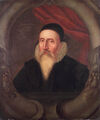Template:Selected anniversaries/July 13: Difference between revisions
No edit summary |
No edit summary |
||
| Line 7: | Line 7: | ||
||1762: James Bradley dies ... priest and astronomer. No DOB. Pic. | ||1762: James Bradley dies ... priest and astronomer. No DOB. Pic. | ||
||1779: William Hedley born ... engineer. One of the leading industrial engineers of the early 19th century, and was instrumental in several major innovations in early railway development. He built the first practical steam locomotive which relied simply on the adhesion of iron wheels on iron rails. Pic. | |||
||1793: Jean-Paul Marat dies ... physician and theorist ... French Revolution ... a vigorous defender of the sans-culottes and seen as a radical voice. He published his views in pamphlets, placards and newspapers. Pic. | ||1793: Jean-Paul Marat dies ... physician and theorist ... French Revolution ... a vigorous defender of the sans-culottes and seen as a radical voice. He published his views in pamphlets, placards and newspapers. Pic. | ||
| Line 30: | Line 32: | ||
||1919: The British airship R34 lands in Norfolk, England, completing the first airship return journey across the Atlantic in 182 hours of flight. | ||1919: The British airship R34 lands in Norfolk, England, completing the first airship return journey across the Atlantic in 182 hours of flight. | ||
||1921: Gabriel Lippmann dies ... physicist and academic, Nobel Prize laureate. | ||1921: Gabriel Lippmann dies ... physicist and academic, Nobel Prize laureate. Pic. | ||
||1934: Mary E. Byrd dies ... astronomer and academic. | ||1934: Mary E. Byrd dies ... astronomer and academic. | ||
Revision as of 06:08, 29 March 2019
100 BC: Roman general and statesman Julius Caesar born. He will play a critical role in the events that led to the demise of the Roman Republic and the rise of the Roman Empire.
1527: Mathematician, astronomer, and astrologer John Dee born. He will achieve high status as a scholar and play a role in Elizabethan politics.
1956: John McCarthy (Dartmouth College), Marvin Minsky (MIT), Claude Shannon (Bell Labs), and Nathaniel Rochester (IBM) assemble the first coordinated research meeting on the topic of "Artificial intelligence" at Dartmouth College in Hanover, NH. USA.
1972: Signed first edition of Skip Digits, Conductor sells for one million dollars; House Democrats say money trail leads to Richard Nixon.
1973: Watergate scandal (nonfiction): Alexander Butterfield reveals the existence of the "Nixon tapes" to the special Senate committee investigating the Watergate break-in.
1974: Mathematician and crime-fighter Hilary Putnam publishes his landmark paper arguing that mathematics is not purely logical, but "quasi-empirical", and that we should beware the possibility of "quasi-empirical crimes".
2015: Steganographic analysis of Blue City Sunset reveals "five hundred kilobytes, perhaps six hundred" of previously unknown Gnomon algorithm functions.






